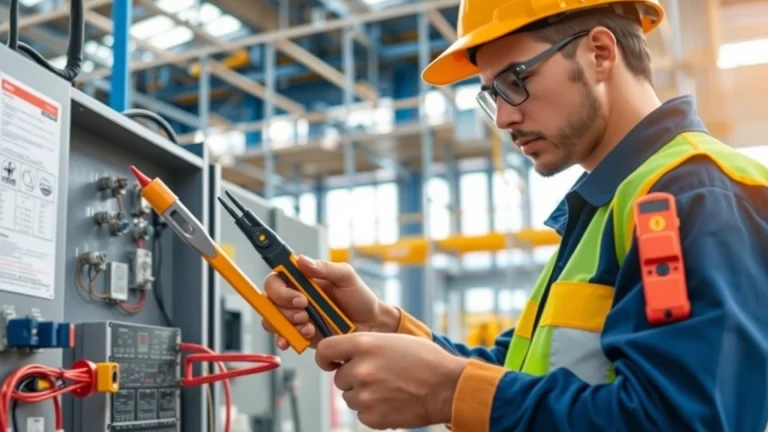
Become an Expert: Navigating the Electrician Apprenticeship in Hawaii
Understanding the Electrician Apprenticeship in Hawaii
Starting a career in the electrical field can be a fulfilling and lucrative choice, especially in a beautiful place like Hawaii. An effective way to enter this profession is through an electrician apprenticeship in Hawaii, which combines hands-on experience and classroom learning. In this comprehensive guide, we’ll delve into what electrican apprenticeship programs entail, the training involved, and how they pave the way for a successful career as an electrician.
What Is an Electrician Apprenticeship?
An electrician apprenticeship is a structured training program that combines on-the-job training with classroom instruction. Aspiring electricians work under the guidance of licensed electricians, gaining valuable skills in residential, commercial, and industrial electrical work. These programs typically last 3 to 5 years, coupled with thousands of hours of hands-on training and theoretical knowledge.
Benefits of Pursuing an Electrician Apprenticeship in Hawaii
Choosing an electrician apprenticeship in Hawaii offers numerous benefits. Some of these advantages include:
- Job Readiness: Apprenticeships provide the hands-on experience necessary to understand the complexities of electrical systems, preparing apprentices for their future roles.
- Earn While You Learn: Apprentices are typically paid during their training, allowing them to earn a wage while acquiring necessary skills.
- Industry Credentials: Successfully completing an apprenticeship often leads to a journeyman electrician status, which is a requirement for many electrician jobs.
- Diverse Opportunities: Hawaii’s unique geographic and cultural features create niche opportunities in the electrical field, from solar panel installation to resilient infrastructure development.
- Community Engagement: Electrician apprenticeships often focus on local projects, allowing participants to contribute directly to their communities.
Requirements for Electrician Apprentices in Hawaii
To enroll in an electrician apprenticeship program in Hawaii, applicants typically need to meet the following requirements:
- Age: Most programs require candidates to be at least 18 years old.
- Education: A high school diploma or equivalent is often required.
- Physical Ability: Candidates should be physically capable of performing manual labor, including lifting heavy equipment and working in various environments.
- Background Check: An acceptable background check is often necessary; certain felonies may disqualify applicants.
Applying for Electrician Apprenticeships in Hawaii
Where to Find Available Apprenticeship Programs
Finding an electrician apprenticeship involves researching various organizations and educational institutions. Some resources include:
- Hawaii Electricians Training Fund: This organization recruits apprentices and provides necessary training programs.
- Online Job Boards: Websites like Indeed and ZipRecruiter can provide listings of available apprenticeships.
- Community Colleges: Many local community colleges in Hawaii offer electrical programs that connect students with apprenticeship opportunities.
Application Process: Tips for Success
Submitting a successful application for an apprenticeship involves several steps:
- Research: Understand the requirements and expectations of various apprenticeship programs.
- Craft a Strong Resume: Highlight relevant skills, previous work experience, and educational credentials.
- Prepare for Interviews: Practice answering common interview questions focused on your skills and interests in the electrical field.
- Follow Up: After submitting applications or attending interviews, express continued interest with a follow-up communication.
Common Challenges and How to Overcome Them
The journey to obtaining an apprenticeship can be challenging. Common hurdles include:
- Limited Availability: Competition can be intense for spots in apprenticeship programs. Applicants should apply to multiple programs to improve chances.
- Physical Demands: The physical nature of the job can deter some applicants. Preparing through physical fitness training can help increase confidence.
- Financial Constraints: Some applicants may face financial barriers. Exploring financial aid programs or scholarships specific to trade education can provide support.
Training and Education for Electrician Apprentices
Apprenticeship Curriculum and Required Courses
The curriculum for electrican apprentices in Hawaii is comprehensive and covers topics crucial for a successful career:
- Electrical Theory: Understanding how electricity works, including volts, amps, and circuits.
- Blueprint Reading: Ability to read and interpret electrical diagrams and schematics.
- Code Compliance: Knowledge of National Electrical Code (NEC) regulations and local amendments.
- Safety Protocols: Training on electrical safety measures to prevent workplace accidents.
- Hands-On Training: Practical experience installing and maintaining electrical systems under the supervision of experienced electricians.
Importance of Hands-On Experience in Training
Hands-on experience is a critical component of electrician training. This practical training allows apprentices to:
- Apply theoretical knowledge in real-world settings.
- Understand the practical applications of electrical systems.
- Gain problem-solving skills necessary for troubleshooting faults.
- Foster relationships with experienced professionals who can offer mentorship.
Resources for Continued Learning and Development
Even after completing an apprenticeship, electrical professionals should pursue continual learning. Recommended resources include:
- Workshops and Seminars: Attending industry workshops focused on new technologies and practices.
- Online Courses: Utilizing e-learning platforms for advanced training in specialized areas, such as renewable energy or smart home technologies.
- Professional Organizations: Joining organizations like the National Electrical Contractors Association (NECA) for networking and professional development opportunities.
Career Pathways After Completing Your Apprenticeship
What Comes Next: Licensing and Certification
Once an apprenticeship is completed, aspiring electricians must obtain the necessary licensing to legally work in Hawaii. This typically involves:
- Passing a state licensing exam that tests electrical knowledge and code compliance.
- Completing a specified number of hours working under a licensed electrician before obtaining a journeyman license.
Exploring Job Opportunities in Hawaii’s Electrician Sector
The demand for skilled electricians in Hawaii is growing due to ongoing infrastructure developments and energy efficiency projects. Potential job opportunities include:
- Residential Electrician: Specializing in installing and maintaining electrical systems in homes.
- Commercial Electrician: Working on electrical systems for commercial buildings.
- Renewable Energy Technician: Focusing on solar panel installation and maintenance, given Hawaii’s commitment to renewable energy production.
- Industrial Electrician: Specializing in large-scale industrial electrical systems and machinery.
Advancement Opportunities and Specializations
Electricians in Hawaii can pursue various advancement opportunities, such as:
- Master Electrician: Achieving this status requires additional experience and passing a more advanced licensing exam.
- Specialization: Electricians may choose to specialize in areas like green technology, telecommunications, or smart home systems.
- Entrepreneurship: Experienced electricians may decide to start their own electrical contracting businesses, offering services to residential and commercial clients.
Real-Life Experiences from Electrician Apprentices in Hawaii
Testimonials from Former Apprentices: Success Stories
Hearing success stories from those who have completed electrician apprenticeships can be inspiring. Many former apprentices share positive experiences about their path:
“I started my apprenticeship not knowing much about electrical work, but the hands-on training changed my life. Today, I’m a licensed electrician, and I love what I do!”
Advice from Industry Professionals
Industry professionals often recommend a combination of hard work, ongoing education, and networking as keys to success in the electric field. They stress the importance of:
- Asking questions and seeking guidance from experienced mentors.
- Staying updated with the latest technologies and trends in the electrical sector.
- Building a solid reputation through reliability and excellent work.
Networking Tips for Aspiring Electricians
Networking can open doors to job opportunities and mentorships crucial for career advancement. Tips for effective networking include:
- Attending local trade shows and seminars to meet industry professionals.
- Joining local electrical associations or unions where peers can share opportunities.
- Using social media platforms like LinkedIn to connect with industry experts.


